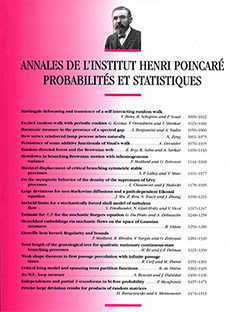Abstract
Consider a superdiffusion $X$ on $\mathbb{R}^{d}$ corresponding to the semi-linear operator $\mathcal{A}(u)=Lu+\beta u-ku^{2}$, where $L$ is a second order elliptic operator, $\beta(\cdot)$ is in the Kato class, and $k(\cdot)\ge0$ is bounded on compact subsets of $\mathbb{R}^{d}$ and is positive on a set of positive Lebesgue measure.
The main purpose of this paper is to complement the results obtained in (Ann. Probab. 32 (2004) 78–99), in the following sense. Let $\lambda_{\infty}$ be the $L^{\infty}$-growth bound of the semigroup corresponding to the Schrödinger-type operator $L+\beta$. If $\lambda_{\infty}\neq0$, then we prove that, in some sense, the exponential growth/decay rate of $\|X_{t}\|$, the total mass of $X_{t}$, is $\lambda_{\infty}$. We also describe the limiting behavior of $\exp(-\lambda_{\infty}t)\|X_{t}\|$, as $t\to\infty$. This should be compared to the result in (Ann. Probab. 32 (2004) 78–99), which says that the generalized principal eigenvalue $\lambda_{2}$ of the operator gives the rate of local growth when it is positive, and implies local extinction otherwise. It is easy to show that $\lambda_{\infty}\ge\lambda_{2}$, and we discuss cases when $\lambda_{\infty}>\lambda_{2}$ and when $\lambda_{\infty}=\lambda_{2}$.
When $\lambda_{\infty}=0$, and under some conditions on $\beta$, we give a necessary and sufficient condition for the superdiffusion $X$ to exhibit weak extinction. We show that the branching intensity $k$ affects weak extinction; this should be compared to the known result that $k$ does not affect weak local extinction. (The latter depends on the sign of $\lambda_{2}$ only, and it turns out to be equivalent to local extinction.)
Soit une superdiffusion $X$ sur $\mathbb{R}^{d}$ correspondant à l’opérateur semi-linéaire $\mathcal{A}(u)=Lu+\beta u-ku^{2}$, où $L$ est lui-même un opérateur éliptique du second ordre, $\beta(\cdot)$ est dans la classe de Kato, et $k(\cdot)\ge0$ est borné sur les compacts de $\mathbb{R}^{d}$ et est positif sur un ensemble de mesure de Lebesgue positive.
L’objectif principal de cet article est de compléter les résultats obtenus dans (Ann. Probab. 32 (2004) 78–99), dans le sens suivant. Soit $\lambda_{\infty}$ la borne $L^{\infty}$ de croissance du semigroupe correspondant à l’opérateur $L+\beta$ de type Schrödinger. Si $\lambda_{\infty}\neq0$, nous prouvons alors que – dans un certain sens – le taux exponentiel de croissance/décroissance de la masse totale $\|X_{t}\|$, est $\lambda_{\infty}$. Nous décrivons également le comportement limite de $\exp(-\lambda_{\infty}t)\|X_{t}\|$, quand $t\to\infty$, sous cette même hypothèse. Ces résultats sont à comparer avec ceux obtenus dans (Ann. Probab. 32 (2004) 78–99), où il est démontré que la valeur propre principale généralisée $\lambda_{2}$ de l’opérateur donne le taux de croissance locale quand elle est positive et qu’il y a extinction locale quand ce n’est pas le cas. Il est aisé de montrer que $\lambda_{\infty}\ge\lambda_{2}$, et nous discutons les cas $\lambda_{\infty}>\lambda_{2}$ et $\lambda_{\infty}=\lambda_{2}$.
Quand $\lambda_{\infty}=0$, et sous certaines conditions portant sur $\beta$, nous obtenons une condition nécessaire et suffisante pour que la superdiffusion $X$ s’éteigne faiblement. Nous montrons que l’intensité de branchement $k$ affecte l’extinction faible; alors qu’il est connu que $k$ n’affecte pas l’extinction faible locale. (Celle-ci dépendant uniquement du signe de $\lambda_{2}$ et est équivalente à l’extinction locale.)
Citation
János Engländer. Yan-Xia Ren. Renming Song. "Weak extinction versus global exponential growth of total mass for superdiffusions." Ann. Inst. H. Poincaré Probab. Statist. 52 (1) 448 - 482, February 2016. https://doi.org/10.1214/14-AIHP645
Information





